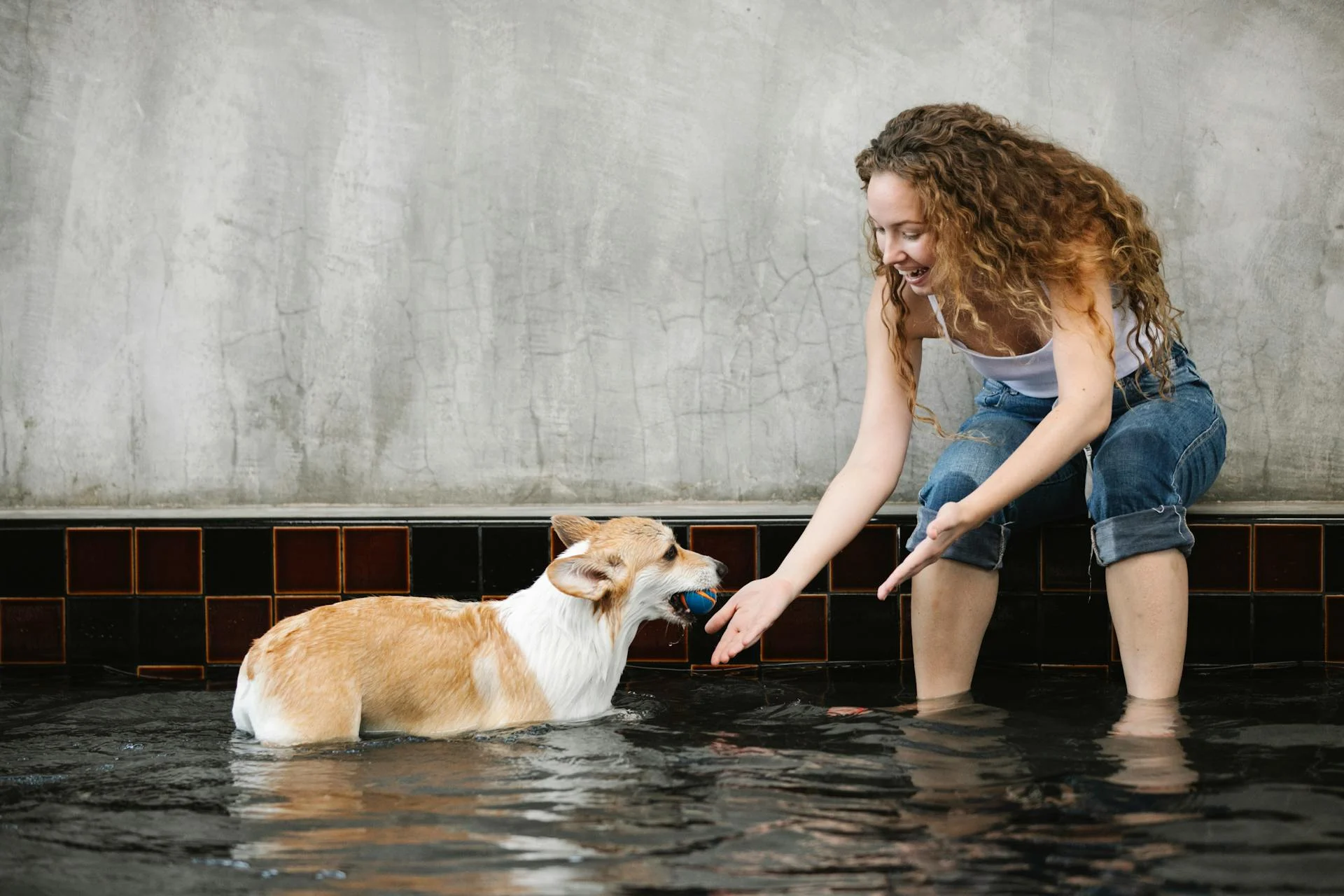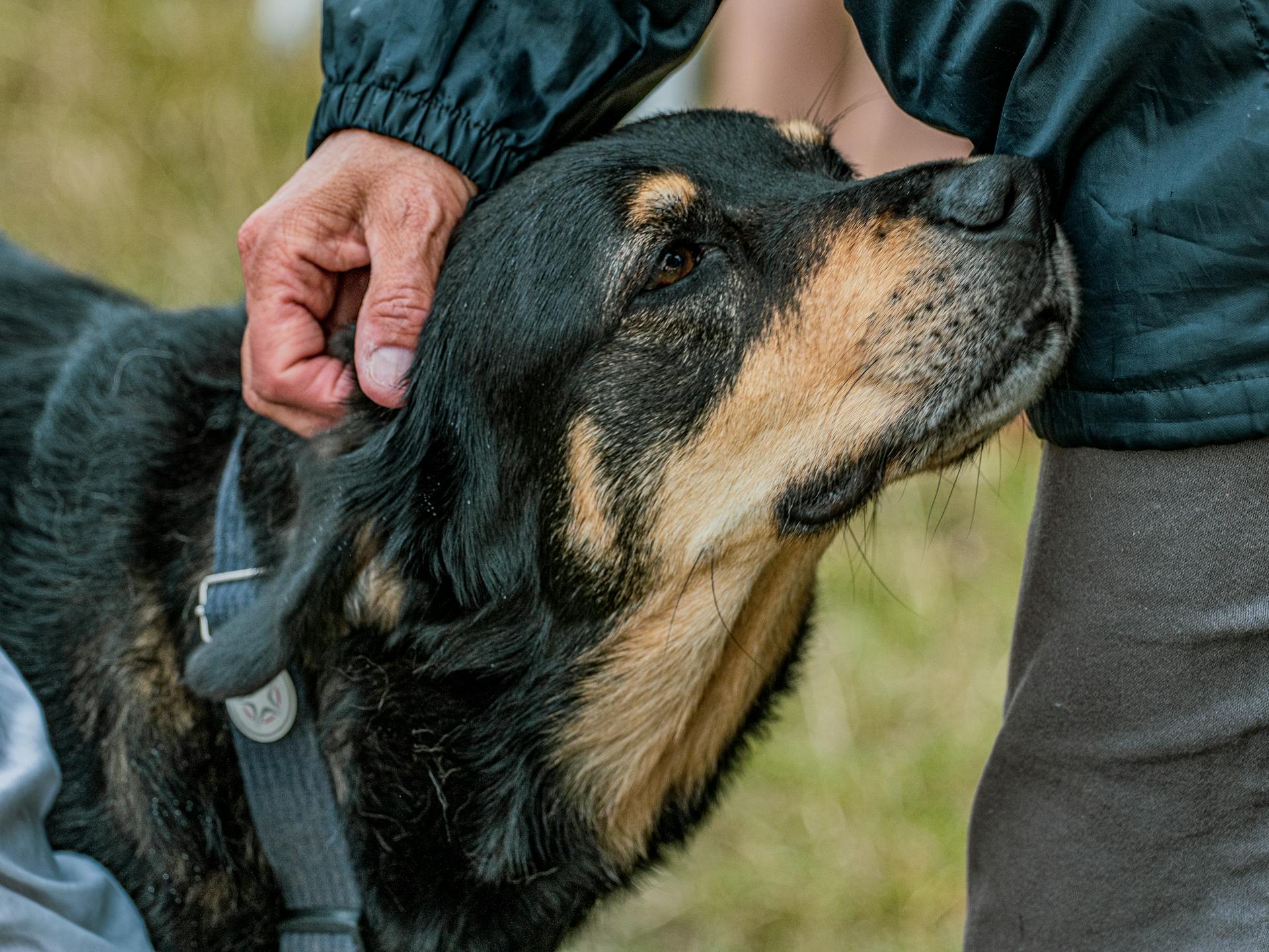
Caring for a dog with dementia can be a challenging and emotional experience, especially at night when they may become restless and anxious. As we discussed earlier, dogs with dementia often have difficulty sleeping due to their altered brain chemistry.
Establishing a consistent sleep schedule can help calm a dog with dementia at night. According to research, dogs with dementia tend to have irregular sleep patterns, which can exacerbate their symptoms. By setting a regular sleep schedule, you can help regulate their body's natural rhythms.
Creating a sleep-conducive environment is also crucial. This may involve reducing noise levels, using calming music, and ensuring the room is at a comfortable temperature. As we learned, dogs with dementia are more sensitive to their environment, so it's essential to create a peaceful atmosphere.
A calming pre-sleep routine can also help signal to your dog that it's time to wind down. This might include gentle exercises, massages, or simply spending quiet time together.
A unique perspective: Dog Wag Tail in Sleep
Understanding Canine Dementia
Canine dementia is a cognitive disorder that affects dogs, causing symptoms similar to Alzheimer's disease in humans. It's a common issue in older dogs, with 50% of dogs over 11 years old showing signs of cognitive decline.
The exact cause of canine dementia is unknown, but it's linked to the physical and chemical changes that occur in the brain as part of the aging process. Genetics or other diseases may also predispose a dog to develop dementia.
Symptoms of canine dementia can range from mild to severe and may include anxiety, irritability, and confusion. Dogs with CCD may wander restlessly, especially in the evening, and may become more "needy" or clingy. They may also experience sleep disturbances, such as insomnia or increased anxiety at night.
Here are some common symptoms of canine dementia:
- Increased, excessive, or unusual vocalizations
- Pacing and restlessness
- "Spacing out" and staring at walls or at nothing
- Less interested in interacting with family or other pets
- Increased irritability or aggression
- Decreased interest in activity
- Confusion or disorientation
- Housebreaking accidents
- Changes in the sleep-wake cycle
- Increased or persistent anxiety
It's essential to note that canine dementia is a progressive disease, and symptoms can worsen over time. If you suspect your dog is experiencing symptoms of CCD, consult with your veterinarian to rule out other medical issues and develop a plan to manage your dog's symptoms.
Canine Cognitive Decline
Canine cognitive decline is a gradual worsening of symptoms over time, making it harder to notice at first. It's a natural part of aging, and it's estimated that 50% of dogs over 11 years old show signs of cognitive dysfunction.
The symptoms of canine cognitive decline can be subtle at first, but they tend to worsen over time. Initially, you may notice mild changes in your dog's behavior, such as decreased interest in activities or increased anxiety.
As the disease progresses, symptoms can become more severe and frequent. For example, you may notice your dog getting anxious or agitated in the late afternoon or evening, a condition known as sundowning.
Sundowning is a common symptom of canine cognitive dysfunction, characterized by restlessness, pacing, and increased anxiety. It's not uncommon for dogs to become more clingy or needy, and may even exhibit aggression.
The exact cause of canine cognitive decline is unknown, but it's believed to be related to the aging process and changes in the brain. Genetic factors or other diseases may also contribute to the development of the disease.
Recommended read: Stop Separation Anxiety in Dogs
Here are some common symptoms of canine cognitive decline:
- Increased, excessive, or unusual vocalizations
- Pacing and restlessness
- "Spacing out" and staring at walls, or at nothing
- Less interested in interacting with family (or with other pets)
- Increased (or more easily triggered) irritability or aggression
- Decreased interest in activity - including playing, going for walks, or socializing
- Confusion or disorientation
- Housebreaking accidents
- Changes in the sleep-wake cycle - sleeping more during the day, awake more at night
- Increased or persistent anxiety
It's essential to work with your veterinarian to determine the best course of action for your dog. They can help you identify the underlying causes of your dog's behavior and develop a plan to manage the symptoms.
Why Dogs Yawn
Dogs yawn for a variety of reasons, including to calm themselves down, especially in situations that might be stressful or overwhelming.
Jones, a 5-month-old dog, is a dramatic yawner, and her owners noticed it as soon as they brought her home at 4 months.
Dogs often yawn when they're feeling anxious or excited, and it's a way for them to self-soothe.
Julie Anne Lee's youngest dog, Jones, is a happy-go-lucky pup, but she still yawns like no dog she's ever seen.
In some cases, yawning can be a sign of underlying medical issues, but in most cases, it's simply a normal canine behavior.
Managing Sundowners
If you suspect your dog is experiencing sundowners, it's essential to rule out any underlying medical issues that could be causing the restlessness, such as pain from arthritis or other diseases.
Consult with your veterinarian to discuss the symptoms your dog is showing and get an opinion on whether they believe your dog has canine cognitive dysfunction and is "sundowning".
Sundowning symptoms can be triggered by unusual shadows, excitement, and activity in the household, making it essential to create a calm environment.
Dogs with cognitive dysfunction may wander restlessly in the evening, much like humans with Alzheimer's disease experience sundowning.
To manage sundowners, establish a consistent routine, including regular exercise and playtime during the day.
Some dogs may become more "needy" or clingy at night, requiring reassurance and attention.
Aiming for a calm evening routine can help reduce anxiety and restlessness in dogs with sundowners.
Here are some strategies to help calm your dog with sundowners at night:
By implementing these strategies and working with your veterinarian, you can help manage your dog's sundowners and create a more peaceful evening routine.
Minimize Their Stress
Encourage your dog to stick to simple activities that aren't too challenging or frightening in the evening hours.
Frustration and stress can add to their confusion and irritability, making it harder for them to calm down.
Allow your dog to stick closer to you at this time of day, as they may feel more secure with you nearby.
Pets will want to stay close to their humans when they're feeling stressed or anxious.
Exercise
Exercise can be a great way to calm your dog with dementia at night.
Taking an afternoon walk can help alleviate some anxiety in dogs.
Older dogs with arthritis or mobility issues will need shorter, gentler walks.
Engaging in play time can also be beneficial for calming your dog.
Be sure to tailor this exercise time to your dog's abilities.
Going outside for just 5 minutes to sniff the air can be enough for some older dogs.
Additional reading: Boarding Dog for First Time
What About Medication?
If the pacing and restlessness is extreme, or none of the other methods help, it may be time to consider medication. Talk to your veterinarian about anti-anxiety meds or Anipryl, a drug that's used to treat dementia in dogs.
Consulting with a veterinarian is crucial when considering medication. Our vet put Mulan on Trazodone.
One pill of Trazodone with her 4pm snack seemed to work best for Mulan. She gets pretty spacey by 6:00 and is not anxious at all.
Most of the effects of Trazodone wear off by morning, and the anxiety is gone.
Frequently Asked Questions
How do I know if my dog with dementia is suffering?
Signs of suffering in a dog with dementia include clinginess, withdrawal, fearfulness, and changes in sleep patterns. If you notice any of these changes, it's essential to consult with a veterinarian to determine the best course of action
What can I give my dog to sleep with dementia?
For dogs with dementia, diazepam (Valium) or longer acting benzodiazepines like temazepam may be prescribed to help with sleep, while selegiline is sometimes used to treat cognitive dysfunction symptoms. Consult with a veterinarian to determine the best course of treatment for your dog's specific needs.
Sources
- https://www.dogswithdisabilities.com/mental-disabilities.htm
- https://dogquality.com/blogs/senior-dog-blog/6-tips-for-managing-dementia-in-senior-dogs
- https://www.whole-dog-journal.com/blog/otto-is-showing-age-related-dementia-symptoms-often-seen-in-dogs/
- https://blog.adoredbeast.com/dog-dementia-dealing-with-canine-cognitive-dysfunction/
- https://raisingyourpetsnaturally.com/senior-dog-nighttime-anxiety/
Featured Images: pexels.com


